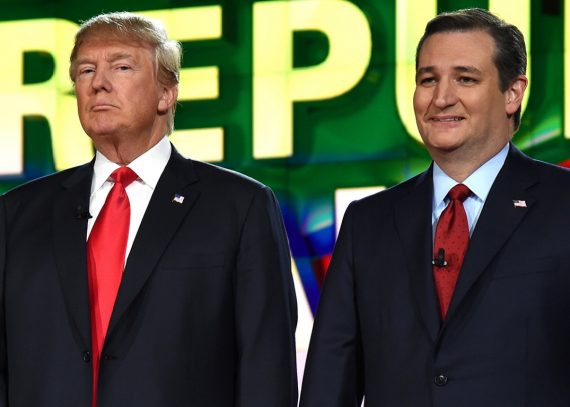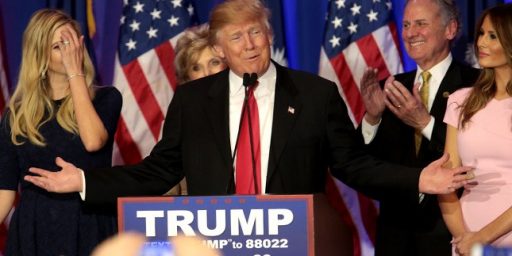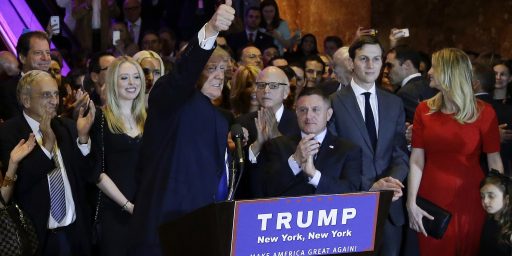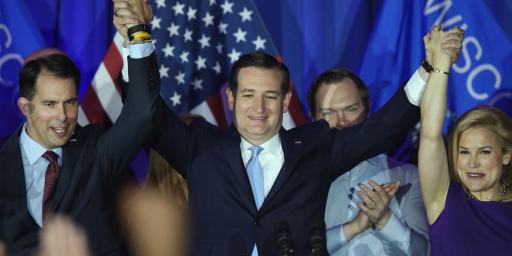Cruz Likeliest Winner in Contested GOP Convention
The second place finisher in the Republican primaries is looking like the first loser.
Despite having been the frontrunner in the polls since well before the first ballots were cast and having won the lion’s share of the votes, Donald Trump looks exceedingly unlikely to amass enough delegates to win the Republican nomination. Jeremy Peters and Jonathan Martin:
The new approach is a tacit admission that Mr. Trump’s campaign, which has been so reliant on national news coverage and mass communication via Twitter, has not been able to compete in the often intimate and personal game that is delegate courtship.
His effort to sow doubt about the system plays into the suspicions and anxieties that many of his most ardent backers have about a political process they believe has intentionally disenfranchised them. And it allows Mr. Trump to divert attention from his recent losses in delegate races that are occurring all over the country.
[…]
Mr. Trump’s complaints also reflect the difficult math he seems likely to face at the convention. Each delegate denied pushes him further away from winning the nomination on the first ballot, after which most delegates would be free to vote for someone else. And after the most recent rounds of voting, Mr. Cruz is poised to have many loyal supporters who would stand with him on a second ballot or beyond.
By its own admission, the Trump campaign has fallen perilously behind in the delegate effort, narrowing Mr. Trump’s road to the nomination with each contest.
The outlook in the coming weeks is not much more favorable. Even if Mr. Trump prevails in high-profile battles like next week’s New York primary, there are growing signs that he is not well equipped to succeed in the lower-profile skirmishes for delegates.
There, Mr. Cruz has an advantage. His campaign recently hired Ken Cuccinelli, a conservative former attorney general of Virginia and a veteran of the state’s internecine Republican battles, to oversee its effort to send pro-Cruz delegates to Cleveland.
The process for choosing delegates can be convoluted and arcane. Even if one candidate wins a state, the delegates who are supposed to vote for him at the convention might privately support one of his opponents, and could do so formally if the nomination goes beyond a first ballot. In some states, like Colorado, delegates selected at a district caucus then vote for separate delegates to the national convention. Because the approach varies by state, campaigns must be well versed in each set of rules.
Ed O’Keefe explains why Cruz is the favorite to win a contested convention:
Trump’s path to amassing the 1,237 delegates he needs to win outright has only gotten narrower after losing to Cruz in Wisconsin and other recent contests, and would require him to perform better in the remaining states than he has to this point.
In addition, based on the delegate selections made by states and territories, Cruz is poised to pick up at least 130 more votes on a second ballot, according to a Washington Post analysis. That tally surpasses 170 delegates under less conservative assumptions — a number that could make it impossible for Trump to emerge victorious.
[…]
Cruz’s chances rest on exploiting a wrinkle in the GOP rule book: that delegates assigned to vote for Trump at the convention do not actually have to be Trump supporters. Cruz is particularly focused on getting loyalists elected to delegate positions even in states that the senator from Texas lost.
On Wednesday in Indiana, for example, Republican leaders are finalizing a delegate slate that will include party activists unlikely to vote for Trump in the state’s May primary. Cruz also is poised to sweep Wyoming’s 26 delegates this weekend in a state where Trump’s campaign did not seriously compete. In Arkansas, Cruz supporters are exploring ways to topple Trump when delegates are chosen next month. And Sen. Marco Rubio (R-Fla.) has refused to release 171 delegates he won when he was in the race, signaling that he may contribute to the anti-Trump push in Cleveland.
[…]
When the presidential nomination vote is held at the convention, 95 percent of the delegates will be bound to the results in their states for the first vote, giving Trump his best shot at securing a majority.
But if Trump falls short, the convention will cast a second ballot in which more than 1,800 delegates from 31 states — nearly 60 percent of the total — will be unbound and allowed to vote however they want. By the third round, 80 percent of the delegates would be free, sparking a potential free-for-all that could continue for several more rounds.
That is the crux of the state-by-state battle that is playing out over the next two months as Republicans gather at the precinct, county, congressional district and statewide level to choose convention delegates.
“If we go into a contested convention, we’re gonna have a ton of delegates, Donald is gonna have a ton of delegates, and it’s gonna be a battle in Cleveland to see who can earn a majority of the delegates that were elected by the people,” Cruz told a meeting of the Republican Jewish Coalition in Las Vegas on Saturday.
He predicted that the first ballot “will be the highest vote total Donald Trump receives. And on a subsequent ballot, we’re gonna win the nomination.”
If Cruz prevails, it will be because of what supporters are doing for him nationwide with what they say is little direct input from his campaign headquarters.
While I share my co-blogger Doug Mataconis’ view that Trump’s claims of the system being “rigged” are over the top and that Cruz is merely playing the game by the rules that exist, Trump’s underlining claim that this process is fundamentally undemocratic is certainly reasonable. And, unlike Doug, I think that’s quite problematic. If we’re going to have a system where citizens are asked to vote for the nominees of the two parties, then the nominations should reasonably reflect the outcome of those contests.
To be sure, Barack Obama bested Hillary Clinton for the 2008 Democratic nomination exploiting similar disparities in the system. And, frankly, there are all manner of systemic inequities in our electoral process, whether from the winner-take-all system used by most states to allocate Electoral College votes to the fact that state legislatures are allowed to draw Congressional districts to maximize the likelihood of their party winning seats. And that’s to say nothing about the plethora of caucuses held instead of primaries, seemingly for the purpose of driving down participation. But the allocation process in the primaries is even more flawed, with it being possible for a candidate who got next to no support in the primary or caucus to emerge with more delegates than the statewide winner.
If Trump falls short of coming to the convention with a majority of delegates, it’ll be by a small margin. And, quite probably, not even as a result of his having failed to win enough voters over. Rather, it’ll be because Cruz, who is vastly less popular and less successful by any measure at attracting voters than Trump, was more skillful at navigating the arcane, behind-the-scenes process of wooing delegates. That’s not only undemocratic but unseemly.
I say all this as someone who would be very pleased to see Trump lose. If he fell short of a majority legitimately–simply as a function of not winning enough states because the field was so large—I’d be happy with almost any subsequent process that denied him the nomination. While I’d be hard pressed to vote for Cruz—indeed, I don’t see myself doing so at this juncture—he’s both more qualified and representative of the Republican platform than Trump. He’s even less likely, in my judgment, to be able to defeat Hillary Clinton than Trump. But nominating him wouldn’t permanently taint the GOP brand in the way Trump as standard bearer would.
Alas, it looks very much like the process that stops Trump will be illegitimate. And that’s likely to not only to ensure his voters won’t go to the nominee in November but perhaps to permanently split the party.






Actually, I generally agree with this position, which Is why I think the GOP is going to be in a very difficult position if we get to a contested convention and they end up nominating someone other than the person who received the most votes and the most delegates. Thanks to ballot access sore loser laws, it will likely be too late at that point for Trump to mount an effective third party/independent bid — not to mention the fact that he probably does not have sufficient liquid assets to fund such a bid on his own — but that doesn’t mean he couldn’t cause problems for the GOP heading into November. My main argument against Trump’s complaints, though, isn’t so much to defend the rules as they exist but to note that there was nothing preventing Trump from competing for delegates in Colorado, or acting at the convention level to pick delegates in states like Louisiana or Indiana. The fact that he didn’t do so, whether by choice or because his campaign is behind the curve on the delegate issue, is either his fault or his campaign managers, and since Trump doesn’t strike me as a guy who is giving his campaign people much discretion to act without his approval I’d say the buck stops with him.
Of course, the GOP faces a whole different set of problems if Trump does win the nomination, but that’s an issue for another post.
I think you’re dead on, James.
Ted Cruz is the GOP base’s “no more excuses candidate.” His nomination will temporarily put an end to the base conservatives’ incessant whining that they’re not heard, that the Party does nothing but nominate liberal Republicans like Bob Dole, John McCain and Mitt Romney.
I wonder how Cruz will play in a place like California, or Pennsylvania, Ohio and Michigan? He certainly will not get anyone to crossover, and there are very, very few Independents to be had. Cruz would probably cause great turnout among Democratic constituencies too. Unless Hillary is indicted (yes, it is a GOP fantasy) Hillary wins the General Election.
I’m of the opinion that the party is already permanently split. I don’t see any good news going forward …
Trump. If not Trump, Cruz. Hope your proud of Republican Party. The out party is never more than one scandal or crisis away from power. Pray Hillary’s health holds up.
God help us.
What are you talking about? Obama got more votes and more delegates in 2008. The only disparity he exploited was the disparity between the number of people who supported him and supported her.
@Nitpicker:
Actually, according to this source and others, Hillary Clinton got roughly 300,000 more popular votes than Barack Obama throughout the course of the 2008 Democratic Primaries. Although it should be noted that counting popular votes is complicated by several factors, including the fact that some caucus states do not make raw vote totals public.
Probably not indicted due to the current DOJ corruption. But if she wins, there is little doubt that any one in the intelligence community who value the lives of their agents and assets in the field, will sandbag their reports and hide the identities lest the report end up at the White House or in the Presidential briefing.
And keep in mind, such a security risk is not just being publicized in America, many potential assets will decline recruitment rather than be exposed to enemy governments.
Personally I don’t find this undemocratic, or at least no more so than many parliamentary democracies around the world. Basically, multiple parties run and they get the chance to win outright. If they can’t close the deal, the horse trading begins. Look at it this way: If no one can close the deal they need some sort of a tie breaker. That tiebreaker could be that the person with the plurality wins, but it doesn’t have to be. And there are really good reasons why it shouldn’t be, or at least not automatically. See Rob Ford of Toronto.
And FWIW, one of the things that switched my primary vote from Clinton to Obama was the fact that Obama’s team had the delegate thing figured out better than Clinton and that demonstrated a level of steadfastness and maturity that I worried someone so young would lack.
Yeah, even is something magical happened after the convention and all the Republicans and Independents who voted Republican in the last two elections were to vote for Cruz, he still doesn’t win.
On the other hand, if the GOPe were to stop throwing a tantrum and the same happened with Trump, his appeal to center Democrats and nominally Democrat Independent voters has a shot putting him in the winner’s circle.
But the petulant GOPe prefer another decade out of the Whitehouse. On the upside, for those no-longer-young Republicans who’ve been hoping for a sinecure in government, there will probably be a lot fewer young Republicans graduating so although they’ll be 20 years in the desert in 2024, there may still be openings.
2018 could be fun with a new and viable third party in the mix.
@MarkedMan:
On the other hand, we are the offspring of a bunch of colonists who picked a fight with a superpower after taxes were reduced because it was still taxation without representation.
Purely from an aesthetic standpoint, the thought of looking at either of those two faces from January 2017-January 2021 gives me the willies.
@JKB:
Every single Democrat I have discussed Cruz with finds him utterly revolting. What exactly is this “appeal” you speak of?
@JKB:
A corrupt DOJ would indict a weak case. She’s probably not going to be indicted because the DOJ isn’t that corrupt and the criminal case is quite weak.
Also:
There is little doubt that this won’t happen.
Trump doesn’t appeal to center Democrats or independents. He also doesn’t appeal to many Republicans.
Actually, I think the GOP would very much prefer to control all branches of the government, but they find that more and more difficult with their supporters’ preferences.
@JKB:
DOJ Corruption? Well that certainly goes a long way to toward explaining why Colin Powell and Condoleeza Rice were not sanctioned or indicted for using private email instead of the State Department Server.
Also, there is currently no evidence whatsoever that Hillary’s use of a private email server caused the compromise or endangerment of any intelligence field staff. We would have heard it by now. After 25 years, Republicans are transparently desperate to get Hillary for something.
Cruz may win in a contested convention, but Trump will then run as a third party candidate where either Hillary or Sanders wins. – With Hillary losing so many states and slipping nationally in recent polls to a rising Sanders, super delegates will need to examine whether to continue to support a fading candidate like Clinton who also brings substantial risks because of scandal or whether to recognize that she has lost confidence and momentum, where it’s time to move to nominate Sanders. Sen. Merkley of Oregon moving to support Sanders may be the beginning of super delegates moving away from the sagging Clinton Campaign, which other than New York state is beginning to look like a sinking ship taking on water from slow leaks…
@Paul Hooson:
True, except for New York. And Maryland. And Pennsylvania. And Connecticut. And New Jersey.
🙂
Sorry, that’s a myth.
Here are the basic facts: It is true that the official popular-vote count was higher for Hillary than for Obama. But this was a meaningless technicality, because it was based on including the results in Michigan, a state where Obama wasn’t on the ballot.
What happened was that in 2007, the DNC penalized Michigan and Florida for rule violations, and the punishment was that they wouldn’t get any delegates placed in the convention. All the candidates, including Hillary, agreed not to campaign in those states, and in Michigan several of the candidates, including Obama but not Hillary, had their names removed from the ballot.
So if you count Michigan, a state where Obama wasn’t on the ballot and which was preemptively taken out of the delegate contest, Hillary technically leads in popular votes; take it out, and Obama leads.
http://www.factcheck.org/2008/06/clinton-and-the-popular-vote/
The canard that “Hillary won the popular vote in the 2008 primaries” was basically invented by Hillary herself. In 2007 she had accepted the DNC’s decision to strip Michigan and Florida of delegates. She didn’t utter a peep of protest until January, after Obama had scored his surprise win in Iowa and was closing in on a huge victory in South Carolina. Then, suddenly she began arguing that Michigan (which she had “won” even though nobody had campaigned there and her leading rival wasn’t an available option to voters) should have its delegates placed. Her position smacked of desperation, which of course it was. And later in the race, shortly before she conceded to Obama, she kept repeating that she’d won the popular vote (without explaining the context) and insinuated that it was a repeat of Bush v. Gore. (That, of course, had to do with voting irregularities and a recount in Florida, not with Gore’s national popular vote lead, which was a separate issue.)
It was not one of her finer moments; it was the essence of a “Clintonian” lie where you state something that may be technically accurate but which is still deliberately misleading. And it’s amazing how many people continue to repeat this lie today.
Part of the reason this myth lives on is because there were a few states (Texas was one) in which Obama secured more delegates than Hillary while trailing her in the state’s popular vote. This got a lot of media attention at the time, lodging it in people’s memories. The more arcane fact that by the end of the race, he not only led her in delegates but also in total votes in states where they both competed, fell by the wayside.
As the GOP leaders told Sean Hannity earlier this week, the voters decide nothing the convention decides everything. The only time this isn’t true is when the leader comes with a first-ballot win, which looks unlikely in this case. As for the problems that the situation will cause the party, I’m soooooooooo sad for them. ;-/
The fact of your saying that shows that you have no idea of what the word “taint” actually means.
@JKB:
I’m not sure this is a negative thing. You’re admitting that people who believe obvious GOP nonsense that’s contradicted by the actual evidence and common sense might decline public service? Hardly seems like a problem.
@Nitpicker: @Doug Mataconis: @Kylopod: There were several states where Obama’s superior mastery of the delegate selection process turned losses into wins or ties. Whether that mattered in the end, I don’t know given the arcane rules. Both parties have very odd delegate selection processes.
@al-Ameda: we’ll play better than Donald Trump will. Trump’s negatives are already at 75% plus. I don’t think there’s any salvaging that candidacy
I was reminded yesterday via Balloon Juice that Charlie Pierce said years ago,
A couple of months ago I was saying that if Trump got close the Republicans would, of course, nominate him. I finally realized that there is no such thing as “the Republicans”. If Trump gets 1236, it’s Cruz and/or chaos.
Rich Lowry put it this way…
The GOP establishment biggest fear at this point is Ted Cruz being a marvelous success in the White House. And comma their second biggest fear is Ted Cruz being a marvelous electoral success as well. They know Donald Trump doesn’t have a shot in Hell of winning with 75% negatives. Their biggest fear is Cruz winning and being a success in the white house because they know that after that they don’t have any more excuses about how they have to offer up Centrist like McCain for example or Mitt Romney or Bob Dole.
@Eric Florack:
If true then the GOP establishment has absolutely nothing to worry about.
@Eric Florack: Everyone’s entitled to their own opinions. But when yours are that far out, you really should provide some support.
@Eric Florack:
Well at least we have the answer to whether any candidate meets bithead’s test to be a True Conservative. In a way, I hope Cruz wins the nomination, so we can finally put to rest his frequent assertion that if a True Conservative were to be nominated, he would win in a 1984-type landslide.
@Eric Florack: Of course, you forget to mention Cruz’ unfavorability ratings of 56% (Pollster avg). And his whacked positions have not even been examined yet.
@Eric Florack:
So that explains why they’ve been throwing their support behind him as of late. What better way to stop the thing you fear most than take concrete steps toward making it happen?
Interesting reflection on the Repub’s dilemma in the Atlantic this AM by Peter Beinart in which he says that a Trump win in the convention will leave the wreckage of the R-party to be reassembled by the Cruz faction whereas a Cruz win this year will allow the less doctrinaire (“conservatives who care about winning”) segment to be the saving remnant.
@Kylopod:
At this point, the GOP establishment is just trying to stop Trump by any means.
If we end up with a brokered convention, that’s when efforts may be made to get someone other than Cruz.
If I was in the GOP establishment, then I might be inclined to allow Cruz to win the nomination with the expectation that he will lose in November. That provides two advantages: (a) for all practical purposes, he won’t be able to run again and (b) it gives the establishment an I-told-you-so teachable moment for the social conservatives.
Unfortunately for them, (b) wouldn’t do them any good, as this is not a group that is inclined to be introspective or take responsibility for anything. (Accountability is important only for other people.)
I suspect that the establishment understands that last point, so it may push for Kasich or someone else, instead. Or it may try to broker a unity ticket of sorts with both Cruz and Kasich, possibly with the latter in the driver seat. We’ll see.
Happy to be of help…
@Pch101: I’m perfectly aware that many of the Republicans now supporting Cruz view him simply as a foil and hope they can snag a different candidate at the convention. I was simply delivering a snarky response to Eric Florack’s suggestion that Cruz is who they fear most.
I do think, however, that many of these Republicans genuinely believe Cruz to be the lesser of the two evils. Lindsay Graham captured this feeling in his recent Daily Show appearance. He was asked about how he reconciled his current support for Cruz with his earlier statement that choosing between Trump and Cruz is like choosing whether to be shot or poisoned. He replied that, with poison at least there might be an antidote.
@Moosebreath: Nah! Bit’ll throw Cruz under the bus quicker than you can say “Conservatism can only be failed.”
@Kylopod: When Graham or any other establishment figure says that Cruz is somehow better than Trump, remember that they aren’t thinking about who might be a more successful candidate, or who might be a better president. They are thinking about who will do the least damage to the Party, but mostly about who will do the least damage to them personally.
@gVOR08: Agreed–except the “personal” part is a bit complicated, as I suspect most Republican Senators have more personal loathing for Cruz than for Trump, having had to deal with him directly.
@Eric Florack:
and their third biggest fear is fairies riding unicorns.
@Eric Florack: So this post re-enforces the notion that conservatives like Florack are only for things when they see the “enemy” as against them. He’s for Cruz not because of a list of reasons. He’s for Cruz because that EBIL LIBERAL GOP establishment is against him.
If logic and evidence worked on them, they wouldn’t be the GOP base.
keep in mind, these are people who believe thermometers are lying.
@steve s: I agree. There are a few points to consider:
(1) If Cruz somehow wrests the nomination away from Trump at the convention this year, there’s no way Trump or his supporters would accept it as legitimate. Whether or not Trump chooses to go third-party at that point, it’s a near certainty he would never endorse the GOP ticket, and he may well openly encourage his supporters to stay home on Election Day or vote for someone else. This will give the True Conservatives the perfect excuse when and if Cruz goes down to defeat in the general election: he would have won if the Trumpsters hadn’t sabotaged him.
(2) I could be wrong, but Cruz strikes me as a shrewd enough politician to make some pivot toward general-election voters. That would provide an additional excuse for True Conservatives if Cruz loses: he didn’t stand firm with conservative principles. (And they’d conveniently forget that Reagan did the same thing in 1980, walking back his past opposition to Medicare, for example.)
(3) Of course the elephant in the room is that the True Conservative Candidate theory has already been tested and failed–in 1964. True Conservatives have a strange way of pretending as if the Goldwater debacle never occurred, even when they’re discussing their theory in an explicitly historical context. So even if a True Conservative candidate were to be nominated cleanly, stuck firmly to his True Conservative positions in the general election, and went down to a landslide defeat in November, his True Conservative supporters would find some way to explain it away.
donald trump was so horrible a candidate that a few weeks ago ted started getting a boost in the polls and on the betting sites. Then people started paying attention to how horrible a person Cruz is, and now he’s sinking again.
The GOP is in a bind. Trump appeals to voters who want to be rich loudmouth jerks, and cruz appeals to voters who want to force their bible on everyone else. Those are like the two base factions of the GOP.
@JKB: two words: “Valerie Plame”